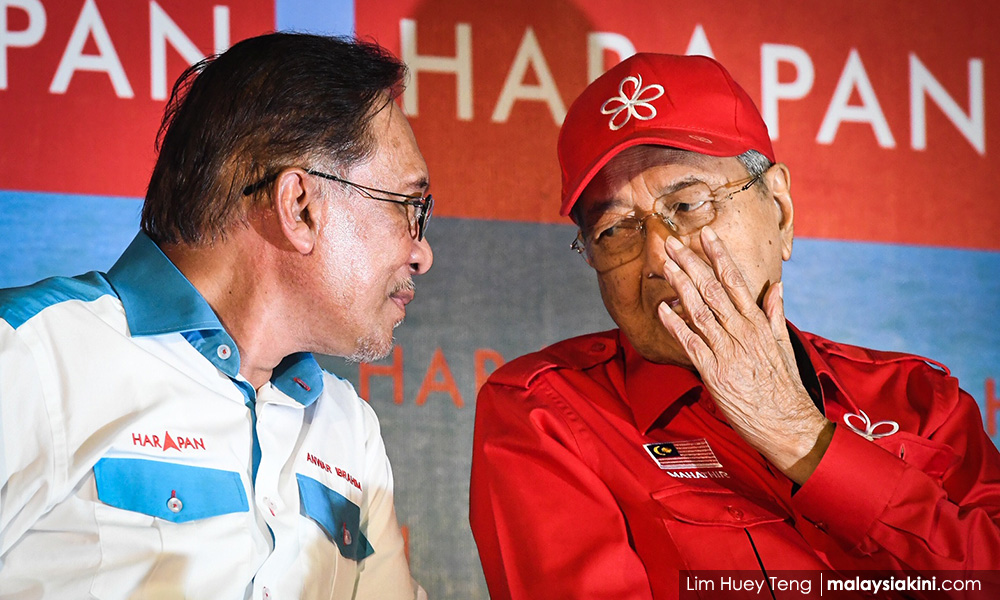
How Anwar Ibrahim must wish he had what the poet John Keats described as “negative capability.”
This is the ability, despite doubts and uncertainties, to persist in one's path and create something where there was none.
Most of the good and the great in history had something of this trait in their journey to the top; it is indispensable for the forging of lasting achievement.
Doubts have long gnawed at Anwar about whether Prime Minister Dr Mahathir Mohamad will hand power over to him.
An understanding on the handover – not so much its timing as its necessity – was crucial to obtaining agreement among principals in the presidential leadership council of Pakatan Harapan in the immediate prelude to GE14 on May 9, 2018.
The understanding was Mahathir would be Harapan's PM-designate for an unspecified period before Anwar takes over as PM should Harapan win GE14.
The understanding was critical to disparate components of the Harapan coalition coalescing behind a final push to eject the long-decayed BN.
That an incarcerated Anwar was uneasy about this understanding showed in his willingness to speak (some say, negotiate) with then prime minister Najib Abdul Razak of BN on the phone before and immediately after the vote on May 9, 2018.
Shortly after the polls, Anwar vented details of those conversations. His disclosure that he advised Najib to accept the reality of BN's defeat in the tense hours after the vote count was over and Harapan had won were more self-serving than revealing.
Adding to the intrigue was the palace summons to his wife, Wan Azizah Wan Ismail, the leader of the party (PKR) with the most seats in the Harapan coalition, for an audience in the wee hours with the king.
Her principal concern, then, was to obtain a pardon for Anwar; it should have been to convey that Harapan was united behind Mahathir as its choice of PM.

The tangle of covert motives and misplaced priorities shed its poison on the subsequent Mahathir-Anwar relationship, burdened already with a past legacy of antagonism over Anwar's sacking by Mahathir from Umno and government in 1998.
If the understanding that had placed Mahathir as Pakatan PM-designate was a reflection of the maxim that politics is the art of the possible, the events in the immediate aftermath of the vote count confirmed that what emancipatory possibilities creative politics might engender, these could only be sustained by the goodwill of its proponents.
There was more intrigue than good intentions in the wee hours after it had become clear that Harapan had won GE14.
Presumptive rather than heir apparent
Anwar's deportment, after he had obtained a royal pardon, was indelicate.
If discretion is the better part of valour, Anwar showed scant grasp of this wisdom by setting himself on a course of presumptive rather than apparent heir to Harapan's premiership.
The distinction is a fine one: the former projects one as an alternate; the latter infers that you are to bring up the rear when your time arrives.
This role requires the delicacy of a walk on egg shells. It demands equipoise; Anwar is short of the finesse.
His lack of Keats' “negative capability” finds him wanting to respond to every tremulation from Mahathir about the power transition.
He is prone to this tendency because he has not gainfully occupied himself in the interim before he is to become PM.
The Malays have a saying about this – “Rumah kosong hantu masuk” which is akin to the English “Idle minds are a devil's workshop.”
Something of how he could have usefully employed himself could be seen in the just-announced Finance Ministry decision to grant a lifetime monthly pension of RM5,000 to seven national Bahasa Malaysia literary laureates.

Anwar would have factored behind-the-scenes in the decision to grant the monthly pension. Kudos to him and Finance Minister Lim Guan Eng.
Anwar cannot hope to win in the static between him and Mahathir on the if-and-when of the power transition.
On fluid issues, you cannot win against someone who exemplifies the truth of what another literary icon F Scott Fritzgerald defined as the test of a first-rate intelligence.
This is the ability to hold to two opposed ideas and at the same time retain the ability to function.
Mahathir is a master canoeist who can paddle on both sides of his craft while navigating rapids: he can think and manoeuvre such that he will not hand power to Anwar and, with equal conviction, proceed with his work and say he will.
It's an exceptional few who can carry this off and in that sense, Mahathir has something of Keats' “negative capability”.
TERENCE NETTO has been a journalist for more than four decades. - Mkini


No comments:
Post a Comment
Note: Only a member of this blog may post a comment.